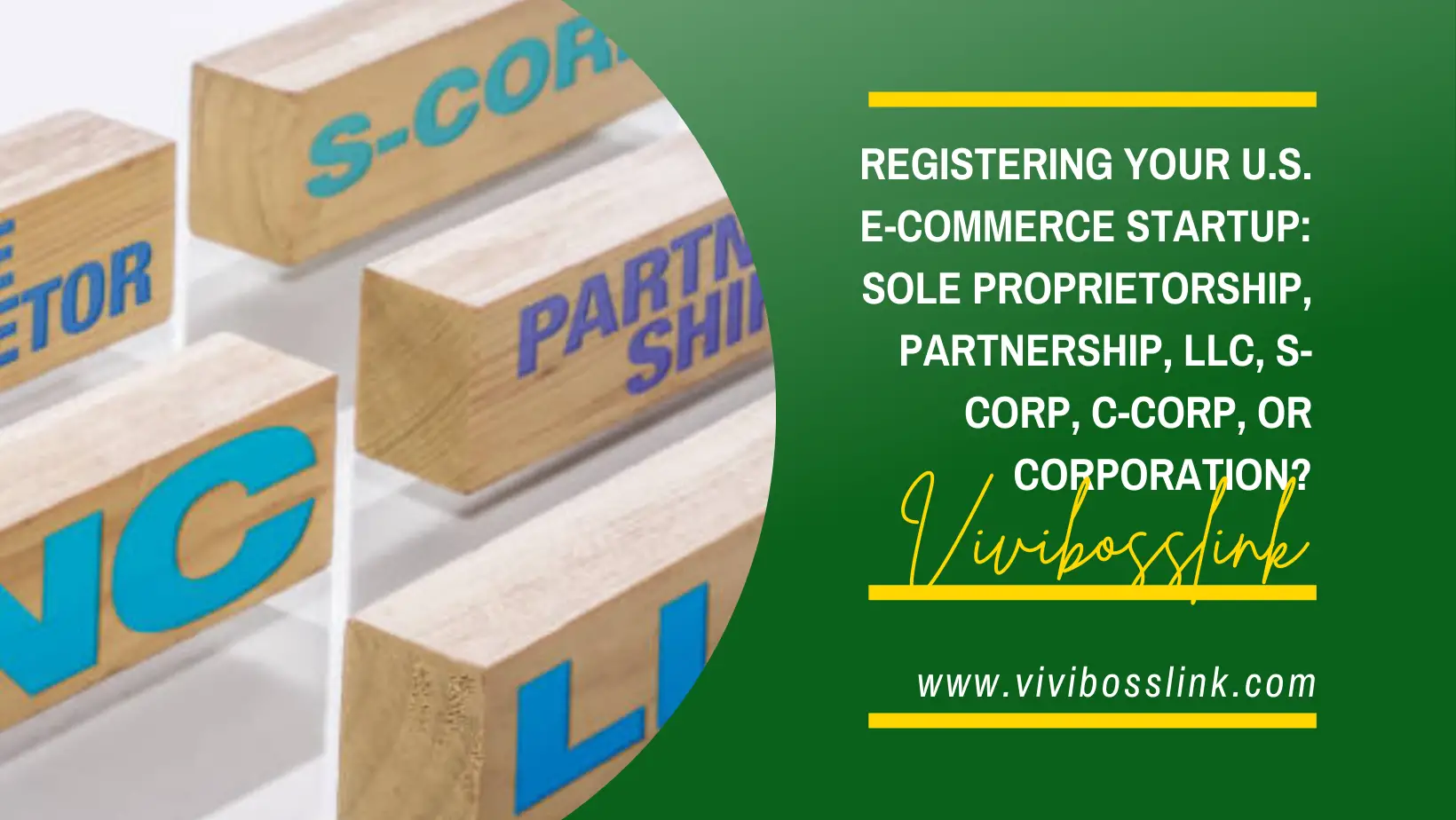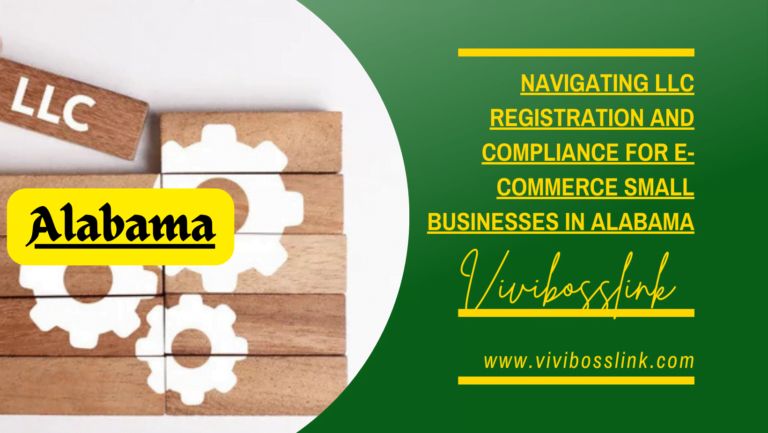
In this Article we are going to discuss Business entity structures in the United States, as well as the tax structures and we make our recommendation of the best Business entity structure and tax structure for e-commerce start up Businesses in the United States.
The United state has the following Business entity structures;
- Sole proprietorship
- Partnership
- Limited Liability Company (LLC)
- Cooperation
The United States have the following tax structures;
- Taxed as a Sole proprietorship
- Taxed as a Partnership
- LLC default tax structure
- S Corp tax structure
- C corp tax structure
Business entity structure is the legal structure in which your Business is set up whereas your tax structure is how your Business entity is categorised to be taxed by the IRS.
A sole proprietorship is a Business entity structure that is taxed as Sole proprietorship, we shall explain this further in this Article.
A partnership is a Business entity structure that is taxed as a partnership. We shall also explain this further in this Article.
A limited liability company (LLC) is taxed as a default LLC however the LLC can choose to be taxed as an S corp or C corp. We will be discussing this in more detail further down in this Article.
A Corporation is taxed by default as a C corp but can elect to be taxed as an S corp.
Our Recommendation; for U.S E-commerce start ups, we recommend registering an LLC, specifically a multi-member LLC Business entity structure, if the owners/members of the LLC do not reside in the US, we recommend maintaining the default LLC tax structure but if all Owners/members of the LLC are US residents, then we recommend choosing the S corp tax structure.
Now you have a summary of the US Business entity structures and the US tax structures as well as our recommendation. Let’s now go into a more in-depth explanation of the US Business Entity structures, Tax structures as well as the reasons behind our recommendation.
Having an in-depth understanding will also enable you to weigh the options available and make an informed decision that is best fitted for you. Remember, our recommendation is generally geared towards e-commerce start up Businesses but you may decide that another option may be more specifically suited for your Business needs and that’s why you really should read through this Article. Now let’s get into the discussions!
Sole proprietorship Business entity structure for U.S. E-commerce Startup
If you start up a Business with only you as the Business Owner, that Business is automatically classified as a Sole proprietorship.
You do not need to have done any paperwork, once you start a single owner Business even without any legal formalities, you are by default a Sole proprietorship.
As a Sole proprietor, you are required to conduct business in your Own legal name. For example if your legal name is Jane Smith and you start an ecommerce Business, you can operate under the name “Jane Smith Store” without needing to register the name.
However, if you would like to operate under a different Business name that is not your personal name and still want to operate as a Sole proprietorship, depending on the state where you primarily operate Business, you may need to register the Business name as a DBA (Doing Business as).
It’s important to note that in the United States, A DBA is registered at the State level, you can check out our Article that lists the requirements of operating an e-commerce LLC or DBA in the 50 U.S. states.
The down side about starting a Sole proprietorship is that a Sole Proprietorship is not a separate legal entity. It has no corporate veil, this means that when the Business incurs liabilities like a debt or lawsuit, your personal assets are not protected, so if you have assets in your personal name like a house, money in your personal bank account etc, a Court can order for your personal assets to be used to pay off any liabilities incurred by the Business. Even personal assets which you acquire in future can be used to pay off the Business’s liabilities.
- How are Sole proprietorships taxed in the US?
Sole proprietorships in the United states for the purpose of income tax, are taxed on an individual level. This means the individual (Sole proprietor) pays income tax on his profit earned from his US sourced income.
US source income is the income attributed to services performed in the US, that is services performed by the Sole proprietor or his dependent agent.
The Sole proprietor is required to pay income taxes in the Country where he lives as an individual and pay income tax in the United States, if he has US source income.
For example if a non US resident sole proprietor is dropshipping products to customers in the United states and fulfilling products others using a US based dropshipping Supplier, the dropshipping supplier is seen as an independent agent because the Dropshipping supplier is not the direct employee of Sole proprietor and is not directly answerable to the Dropshipper, instead the Dropshipping Suppliers runs its own business with its own independent internal management.
The job of the Dropshipper is simply to promote products from their computer and if the Dropshipper is a non US resident and running digital promotion from an office that is not located in the US and do not have any dependent agent or employee in the US but instead fulfils products orders using an independent agent (i.e 3rd party US based dropshipping supplier), the Sole proprietor will not be said to have US sourced income.
Since a Sole proprietor is taxed on an individual level, if the Sole proprietor does not have US source income and is not a US resident, then the Sole proprietor is not required to pay income taxes to the US. He is to pay his income taxes in his country of residence.
On the other hand, if the Sole proprietor is a US resident, then the Sole proprietor is to pay income tax in the US.
Asides income taxes, there are several other taxes that a Business operating in the US may be required to pay, read this article for an overview of taxes that e-commerce businesses may be liable to pay in the US.
Partnership Business entity structure for U.S. E-commerce Startup
If you own a Business with at least one more person, whether or not you take steps to legally register the partnership or not, and Whether or not the Partners are US residents, if the partnership operates Business in the United states, it is considered a Business partnership by default.
In the United States, partnerships can carry out Business in any of the Partners legal names or a combination of their legal names without needing to register the name of the partnership.
For example if one of the partners name is Jane Smith and the other partner’s name is Jason Keneth, the partnership can be called Jane Smith and Jason Keneth store or Jane smith store or Jason Keneth store without needing to register the Business name.
If the partnership wants to operate under a name that is not any of the partners legal name then the partnership, depending on the state where they primarily operate Business, may need to register the Business name as a DBA (Doing Business as).
It’s important to note, that in the United States, A DBA is registered at the State level, you can check out our Article that lists the requirements of operating an e-commerce LLC or DBA in the 50 U.S. states.
A partnership is not a separate legal entity and does not enjoy the legal protection of a corporate veil, therefore the partners are personally liable for liabilities incurred by the partnership.
For example, to offset any debts which the partnership has incurred during the course of its Business operations, the personal assets of the partners can be used to offset the debt or liability.
- What are the types of Business Partnership Structures in the US?
General Partnership; General Partnership is the Default status when you start managing a Business with at least one other person. General partnership happens automatically even if you don’t create a partnership agreement or don’t intend to create a general partnership on purpose.
General partnership means that every single person who is in the Business is personally liable for that Business.
What this means is that if your Business partners go to incur liabilities on behalf of the partnership, for example a loan, lease etc, you are personally liable for it, you don’t have to be the person who signs on the loan agreement or incurs the liabilities in as much as the loan was taken on behalf of the partnership or a liability was incurred on behalf of the partnership, you and all partners in a General partnership will be personally liable.
Limited Partnership (LP); A limited Partnership is a registered Business where most of the Partners have limited Liability but there would be at least one Partner with a General liability status.
This means that the liabilities of some of the members are limited, even though the all members remain personally liable, the limited liability members has a restriction on how much of their personal assets can be used to offset debts incurred by the Partnership, whereas for the General partner, there is no restrictions, all the assets of the General partner can be used to offset liabilities incurred by the partnership.
A Limited Partnership is not a separate legal entity, however since Limited Partnerships are registered Businesses in the United States, a Limited Partnership if registered in States which charges Franchise tax like Delaware or California, will be required to pay Franchise tax.
If you would like to learn more about which states to register your Business, if you want less paperwork, no annual filings and little to no taxes particularly as an e-commerce start up Business in the US, check out this Article.
Limited Liability Partnership (LLP); An LLP is a registered partnership in which the liability of every Partner in the LLP is limited and no partner has general liability status.
An LLP is not a separate legal entity so therefore members are personally responsible for the liabilities incurred by the LLP. However, an LLP protects all partners from debts against the partnership arising from professional malpractice lawsuits against another partner.
In an LLP each partner becomes liable for thier own mistakes and the Partnership does have to pay for the professional malpractice of one of the Partners.
A limited liability Partnership (LLP) is a registered Business, therefore if a limited liability partnership is registered in States which charges Franchise tax like Delaware or California, the limited liability partnership will need to pay Franchise tax.
If you would like to learn which US state to register your Business in if you want less paperwork, no annual filings and little to no taxes particularly as an e-commerce start up Business in the US, check out this Article.
- How are Partnerships taxed in the US?
In the United States partnerships are taxed on an individual level, just like Sole proprietorship, this means that each partner will have to pay income tax in the US only if they live in the US or have US sourced income.
US sourced income is the income attributed to services performed in the United states by the partners or a dependent agent of the partnership.
A dependent agent is a direct employee, an agent who is directly answerable to the partnership. It’s important to distinguish between a dependent agent and an independent agent. An independent agent is a Business which has its own independent management and clients for example; A US Dropshipping supplier or 3PL.
If the partners do not reside in the United States and do not operate their e-commerce Business in the US but rather digitally promote products online from an office which is not located in the US. Even if the partnership uses an independent agent like a US based Dropshipping supplier or 3pl to deliver products to the customer, the partners will not be said to have US sourced income and will not be liable to pay US income tax.
If all the partners are US residents, each partner must pay income tax individually on their own share of their US sourced income from the partnership.
On the other hand, if the partnership has a mix of persons who are non US residents and persons who are US residents (whether or not the partnership have a dependent agent in the US), the US resident partner must pay income tax on their US sourced income and withhold 30% of the income of the non US resident partners (this is called income withheld at source), the US partner must then remit the 30% withheld income to the IRS.
It’s important to note that a partnership can be formed between two individuals, a company and an individual or even between two companies.
If the non US resident is a persons living or a corporation registered in any of the Countries that has a double tax exemption treaty with the US, then the non US resident partner, can claim the double tax exemption treaty benefits by filling IRS Form W8-BEN (if the non resident partner is an individual), Form w-9 (if the non resident partner is operating through a US registered LLC under his/her name) Form W8-BEN-E (if the non resident partner is a non US corporation) the US resident partner can then fill out and file the appropriate form with the IRS, consequently the US resident partner will no longer withhold 30% from the income of the non US resident partner.
Nevertheless, the non-US resident partner (whose income is no longer withheld at source) will be required to calculate and remit the appropriate income tax rate to the IRS if they have earned US sourced income i.e if they have a dependent agent or direct employee in the US.
If the partnership has a mix of US residents and US non residents and the non US resident partner resides in a country that does not have a double tax exemption treaty with the United states, the US resident partner will be required to withhold 30% of the income of the non US resident partner and remit it to the IRS.
Nevertheless, the non-US resident partner can still claim tax refunds from the IRS. For example if the non US resident partner does not have a direct employee or dependent agent in the US and have no US source income, the non US resident can claim a refund of the 30% withholding by filing their income tax returns.
The United States presently employs a progressive federal income tax system comprising seven brackets. These brackets are structured with corresponding rates of 10%, 12%, 22%, 24%, 32%, 35%, and 37%. It’s important to note that these tax rate brackets are applicable to individual income, and the rate increases as one’s income moves into a higher bracket. This progressive system aims to impose higher taxes on higher levels of income, reflecting a tiered approach to taxation.
Therefore in a mixed partnership with US residents and non US residents, when 30% is withheld from the non US residents, that figure is high up in the tax bracket, so if the non US resident is making significantly less income and does not fall under the tax bracket for 30% income tax rates, even if the non US resident has an employee in the US and US sourced income, the non US resident can still file their annual income tax returns to the IRS and claim a tax refund for any excess withholding given their actual income tax bracket.
Example of how partnership are taxed in the US; illustrating with Amazon and 3rd party sellers tax relationship
You can see this play out in most e-commerce partnerships, for example when you open an Amazon seller central Account, a partnership is formed by default. You accept Amazon terms and conditions which work to basically protect Amazon from any liabilities incurred by you and ensure that you operate within Amazon policies.
Because Amazon is a US resident partner, once your Amazon account is created in the North America region, there will be a corresponding tax treaty form (W8-Ben, W-9 or W8-Ben-E) form where you can fill it out to claim treaty benefits. If you live in a country with a double tax exemption treaty with the United States or if you’re a corporation registered in a non-US Country that has a double tax exemption treaty with the United States, the treaty benefits will be applied and Amazon will not withhold 30% of your income.
However if you live in a country with no double tax exemption treaty with the US, Amazon will withhold 30% of your income. Nevertheless, you can claim a tax refund of the 30% withholding by filing your income tax returns. You may qualify for the tax refund if you have no US sourced income or earn significantly low US source income that your actual income tax bracket falls below the 30% income tax rate.
On the other hand, if you are a United States resident partner, Amazon will not withhold any income taxes and you will be required to calculate and remit the appropriate income tax rate to the IRS by yourself.
Limited Liability Company (LLC) Business entity structure for U.S. E-commerce Startup
An LLC is a separate legal entity. This means that an LLC asset is distinct and separate from the members personal assets. In case of liabilities incurred by the LLC, the members personal assets can not be used to offset the debt.
The corporate veil protection that an LLC provides as a separate legal entity is one of the biggest flexes of registering an LLC. It means that your personal asters are protected in case of a Lawsuit.
Sole proprietorships and partnerships do not have the corporate veil protection of a separate legal entity whereas LLC and Corporations have the Corporate veil protection and are considered as a separate legal entity.
Although an LLC has a corporate veil just like a Corporation, one of the advantages of an LLC over a Corporation is that an LLC has cheaper and simpler corporate formalities and paperworks to register and maintain it.
You are the one who has to maintain the business in the long run, would you like more paperwork or less paperwork? Compared to Corporations, LLC is a great option if you want to maintain the Business with less formalities in the long run and still want the corporate veil protection so that your personal assets are protected.
For example; unlike a Corporation, an LLC has no requirement to maintain a governing body like a Board of Directors or a set of officers or hold annual Board of Directors and Shareholders meetings or record minutes of meetings.
An LLC can have a signed member, this is called a Single member LLC. An LLC can also have multiple members, this is known as a Multi member LLC.
We recommend registering a multi member LLC for e-commerce start up preferably compared to a single member LLC, this is because we know from experience that some business partners in the ecommerce space will require that single member LLC’s create platform Accounts in the legal names of the LLC Owner and not in the registered Business name of the LLC, some Business partners may out rightly not accept single member LLCs into partnership with them. Single member LLC is sometimes treated less seriously compared to a multi member LLC.
For example on Amazon, single member LLCs seller Accounts are registered in the legal name of the LLC Owner and not in the registered Business name of the LLC. However, we have not experienced any single case where a multi member LLC is not allowed to create an Account under the LLC’s registered Business name when they partner with other Businesses.
An LLC is registered on the State level. You can decide to register your LLC in any of the 50 states in the US. The requirements and fees for registering an LLC also vary by state.
There are different nuances to an LLC depending on the state of registration. In some states you may have to do publishing of an LLC, some states allow for total privacy through registering an anonymous LLC, some states impose annual Franchise tax on LLCs.
In this Article we evaluate the requirements for registering and maintaining an LLC across the 50 US states specifically for e-commerce start up Businesses and we give our recommendation for the best US states to register your US e-commerce start up if you want less paperwork, no annual filings and little to zero taxes.
- What is the default tax structure for Limited Liability Companies (LLC) in the US?
By default an LLC is taxed as a “see through” Company, however the LLC can choose to file the appropriate forms to the IRS and elect to be taxed as a C corp or S corp. An LLC by default will be taxed as a “see through” Company.
This means that the income tax obligation passes through the LLC and is taxed on an individual level on the members of the LLC.
In case of a single member LLC, the income tax obligation passes through the LLC to the member of the LLC, the LLC member will then be taxed as a Sole proprietor. To get more details on how a Sole proprietor is taxed in the United States, please scroll up and read up on the section of this Article that describes how a Sole proprietor is taxed.
In case of a multi member LLC, the income obligation tax passes through the LLC to all members of the LLC, the LLC members will then be taxed as a Partnership. To get more details on how Partnerships are taxed in the United States, please scroll up and read up on the section of this Article that describes how Partnerships are taxed.
LLCs with default tax status do not have any limitations on the number of members that the LLC can have and members of the LLC can be US residents or non residents.
There are no restrictions as to the residency status of members which makes LLCs with the default tax status a good option for LLCs that want to go public in the future and source funds from investors without restrictions as to the residency and citizenship status of its members.
It’s noteworthy that If you are a non resident of the United State and have registered an LLC in the United States because of the “see through” default tax status of an LLC, if you do not have US sourced income, you will pay $0 in US income tax. This is because your tax obligation is on an individual level, therefore your income tax obligation will be to your country of residence.
Non-US residents who are founders of e-commerce startups can really benefit when they register an LLC in the United States because an LLC is a separate legal entity and non-US resident founders can legally pay $0 in US income tax if they do not have US source income.
The US is one of the biggest economies in the world, that’s why most giant e-commerce companies launch their platforms in the US before spreading out to other countries. As a non US resident, if you have a US LLC you will be able to ensure access to e-commerce platforms that are reserved for US residents.
For example, Tiktok Shop is only available in a few countries including the US, even if you are not a resident of any of the Tiktok Shop supported countries, you could still sell on Tiktok Shop from an unsupported country under your a US registered LLC.
It’s important to note that if you are a non US resident LLC, even if you quality to pay $0 income tax, you will still need to file your US income tax returns (basically just some tax forms), the good news is that you can files your non resident LLC annual income tax for free if you do it yourself. Check out our Article, where we describe how to file your US annual income returns as a non resident LLC.
We recommend non resident U.S e-commerce start up to register an LLC and maintain the LLC default tax status. This is because the income tax obligation will pass through to members of the LLC on an individual level. This means that if the non resident LLC does not have US source income even if they have customers in the US, they will legally pay $0 US income tax.
- Should US e-commerce LLC startups choose to be taxed as an S corp?
Eligible LLCs can file the appropriate forms to the IRS and choose to be tasked as an S-corp.
Should an LLC choose to be taxed as an S-corp and why? First let’s look into what LLCs are considered eligible to make the choice to be taxed as an S-corp and how S-corps are taxed in the United States.
An LLC can elect to be taxed as an S-corp if all members of the LLC are US citizens or legal residents.
While there is no maximum number of members for an LLC with a default tax status, it’s noteworthy that an LLC that has elected to be taxed as an S-corp cannot have more than 100 members.
An S-corp is taxed as a default LLC that is as a “see through Company” however an S-corp has added benefits that can be advantageous for reducing the amount of income tax payable by the LLC.
Let’s discuss the added advantages of an S-corp. An S-corp can distribute some of its profits as Salaries to its Owners.
The income distributed as Salaries will not be subject to income tax. However Salaries may be subject to “payroll taxes (FICA)”. Since Payroll taxes rates are cheaper than income taxes rates, the S-corp will pay less taxes on its income which has been distributed as Salaries to its members.
In case you are wondering what Payroll (FICA) taxes are and how it applies to e-commerce businesses in the United States, in this Article, we have made a comprehensive list of taxes that are maybe applicable to e-commerce businesses in the United States.
S-corps can also distribute its profits as a dividend to its Owners. Profits that are distributed as dividends are not subject to income tax and payroll taxes (FICA).
We recommend eligible LLC e-commerce start ups (that is e-commerce start ups with members that are either US citizens or legal residents) to elect to be taxed as an S-corp because of its tax saving advantages.
- Should US e-commerce LLC startups choose to be taxed as a C corp?
An LLC can also elect to be taxed as C-corp. Let’s look at what LLCs qualify to apply to the IRS to choose to be taxed as a C-corp and how C-corps are taxed in the United States.
Generally all LLC can elect to be taxed as a C-corp because there are no residency requirements, so even if your LLC has non-US resident members, your LLC can still elect to be taxed as a C-corp.
Additionally C-corps (just like LLCs with default tax status) have no member limitation, therefore C-corps can have an unlimited number of members, which makes it a good option for LLCs that want to go public in the future and source funds from investors without restrictions as to the residency and citizenship status of its members.
Most giant companies often elect to be taxed as a C-corp but why do they make that decision and will electing to be taxed as a C-corp be a smart decision for your US small business e-commerce start up?
The biggest drawback for electing to be taxed as a C-corp is the issues of double taxation.
This is because a C-corp is taxed both on the Corporate level and individual level which can lead to double taxation.
A C-corp is taxed for profits retained by the Company to cover expenses or expansion (this is called “retained earnings”) and profits that are distributed to the owners (shareholders) as dividends.
The corporation itself pays income taxes on profits it retains and when it distributes those profits to the Owners, the Owners as well pays income taxes on their profit, meaning dividends are essentially taxed twice.
C-corporation can avoid double taxation by holding all the profits without distributing any profits to members, this way the C-corp is only taxed once on the Corporate level. This strategy is especially good for companies who want to keep reinvesting all the profits on continual research or development thereby avoiding double taxation.
C-corporations can also avoid double taxation by distributing all profits to the members without retaining any profits in the C-corporation.
The biggest advantage of electing to be taxed as a C-corp is that C-corps have tax-advantaged fringe benefits which allows C-corps to claim deductions of fringe benefits as expenses on their income tax returns and thereby exclude these fringe benefits from the taxable income of the employees.
Fringe benefits are non cash compensation or benefits for employees, for example Health insurance premiums given to employees.
It’s noteworthy that Sole proprietorships, partnerships, LLCs with default tax status, and even S corporations may not deduct or write off fringe benefits. So, these deductions are a sole benefit of C corporation status.
Should you elect for your ecommerce start up Business to be taxed as a C-corp? We generally do not recommend it because it could lead to double taxation if the LLC wants to retain profits in the C-corporation and then distribute some profits to its members.
C-corps are great for Companies that want to retain all profits on the Cooperation for continuous research and development which does not reflect the majority of e-commerce start ups.
Also, the tax-advantaged fringe benefits of C-corp may not be of interest to most e-commerce startups, especially non resident LLCs who are not looking to take up Health insurance premiums or fringe benefits for employees.
Corporation Business entity structure for U.S. E-commerce Startup
A corporation is a separate legal entity and enjoys the corporate veil protection. The personal assets of shareholders are separate from the Corporation’s assets.
All shareholders of a Corporation therefore enjoy limited liability protection and their personal assets are protected in case of any liabilities or debts incurred by the Corporation.
The cost and requirements for forming a Corporation in the United States varies by state. Corporations are formed on the State level.
Corporations generally require more cost, formalities and paperwork to set up and to maintain in the long run compared to starting an LLC. For example Corporations are generally required to have a Board of Directors and hold annual Directors and Shareholders meetings and maintain a minutes of meeting.
- What is the default tax structure for Corporations in the US?
By default Corporations in the United States are taxed just like C-corporations.
If you would like to learn more about how C-corps are taxed, please scroll up this Article and read up on the section titled “Should US e-commerce LLC startups choose to be taxed as a C corp?”
- Should e-commerce Corporations Start ups choose to be taxed as an S corp?
Firstly, we generally do not recommend e-commerce business start ups to register a US Corporation because of the higher cost, paperwork and formalities that are required to form and maintain a US corporation. We instead recommend registering an LLC.
However if you have already registered a Corporation and need to know if you should elect for your Corporation to be taxed as an S-corp? Well, It depends on whether your cooperation meets the eligibility requirements to elect to be taxed as an S-corp. i.e if the Shareholders in your Corporation are either US citizens or Legal residents and less than 100.
If you’re an e-commerce small business startup and your cooperation meets the requirements to be elected as an S-corp, we generally recommend electing to be taxed as an S-corp because of the tax saving advantages that an S-corp offers and to avoid the double taxation risks that could occur with an C-corp. (C-corp is the default tax status of a US Corporation)
Irrespective of our general recommendations, you should weigh the tax pros and cons of a C-corp which is the default tax status of a US Corporations against the tax pros and cons of an S-corp and decide which is best suited for your specific business needs.
To learn more about how S-corps are taxed, please scroll up this Article and read up on the section titled “Should US e-commerce LLC startups choose to be taxed as an S-corp?”
To learn more about how C-corps are taxed, please scroll up this Article and read up on the section titled “Should US e-commerce LLC startups choose to be taxed as a C corp?”
Conclusion
Congratulations, if you have gotten to the sweet end of this Article, so in summary, Here is our recommendation; for U.S E-commerce start ups, we recommend registering an LLC, specifically a multi-member LLC Business entity structure, if the owners/members of the LLC do not reside in the US, we recommend maintaining the default LLC tax structure but if all Owners/members of the LLC are less than 100 and are US citizens or legal residents, then we recommend choosing the S corp tax structure.
You can register a US LLC using Incfile, an LLC filling service that makes registering an LLC in the US quick, simple and cost effective.
It’s important to note that our recommendation is generic for US e-commerce start ups. Your specific e-commerce business strategy may require specific preference for Business entity type and tax structure, that’s why this Article provides information to help you understand how different Business entities type and tax structures function in the United states, so you can make an informed decision that is best suited for your own unique Business needs.
Ultimately, the journey of selecting the right business structure and tax framework is an integral part of shaping the future of your e-commerce venture. Armed with this knowledge, you are better equipped to make decisions that align with your goals and set the foundation for a thriving business.







